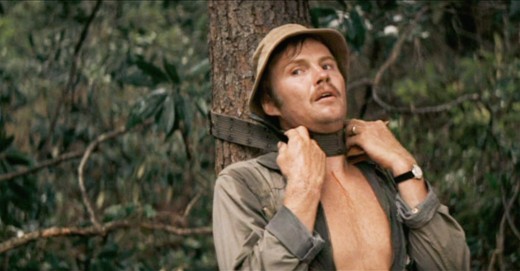We’re gonna leave Friday, from Atlanta. I’m gonna have you back in your little suburban house in time to see the football game on Sunday afternoon. I know you’ll be back in time to see the pom-pom girls at halftime ’cause I know that’s all you care about… Yeah, there’s some people up there that ain’t never seen a town before, no bigger than Aintry anyway. And then those woods are real deep. The river’s inaccessible except at a couple of points… This is the last chance we got to see this river. You just wait till you feel that white-water under you, Bobby…I’ll have you in the water in an hour.
I’d never watched Deliverance. That should be plainly obvious based on its inclusion in this little Cinema Shame adventure. But it was Deliverance that likely headed my initial list of movies I felt shamed for not having seen. So many references. So much chatter. So many shrugs on my part. Plus, Burt. And of the things I’d watch, no questions asked, a Burt Reynolds movie from the 1970’s certainly resides near the top.
Still, I knew I wasn’t signing up for White Lightning, which is probably why Deliverance remained unwatched.
One of the notions that Cinema Shame set out to explore was whether or not such a tardy viewing of a film could overshadow the hype of a classic movie gone so long unseen. By and large, I think the best movies have that power to forever impress no matter the expectations. But what happens when the movie is *exactly* as anticipated. I’d read and heard so much about Deliverance and it unfolded narratively beat for beat, precisely as I’d anticipated.
I knew about the dueling banjos, the canoe trip, Ned Beatty in his skivvies, the aftermath of Ned Beatty in his skivvies, the parallels to the Vietnam War, PTSD shenanigans. What was left for me to discover?
Plenty, as it goes. Deliverance proves to be a much more subtle exercise in restraint and paranoia. Director John Boorman paints the bleak hopelessness of a world at odds with the perpetuity of time and progress. Four suburban businessmen venture out to canoe a river before a damn wipes the river off the map. Time. Progress. The businessmen are ill-equipped to deal with the rigors of nature and the swift, brutal rapids on the Cahulawassee, the inevitable forward momentum down the river. Mortality. Death. Desire to return to nature, to overcome it. Rights of passage. Tests of manhood.
That looming specter of “manhood” hovers over the entire movie. The perceived macho manhood of the sleeveless and ripped outdoorsman in Burt Reynolds. The lack thereof in the fragile renaissance man and banjo plucker Ronny Cox. The insecure chubby guy who overcompensates for a lack of confidence by emulating Burt Reynolds. And Jon Voight — the rational skeptic, the everyman, the eyes through which the audience watches the film. And then there’s that pesky issue of rape — a notion inextricably tied with the abuse and destruction of hyper-masculinity.
Here we go. Ned Beatty’s naked. Shit just got real. #Deliverance
— #Bond_age_ (@007hertzrumble) June 2, 2014
*spoilers ahead*
…because they’re buildin’ a dam across the Cahulawassee River. They’re gonna flood a whole valley, Bobby, that’s why. Dammit, they’re drownin’ the river… Just about the last wild, untamed, unpolluted, unf–ked up river in the South. Don’t you understand what I’m sayin’?… They’re gonna stop the river up. There ain’t gonna be no more river. There’s just gonna be a big, dead lake… You just push a little more power into Atlanta, a little more air-conditioners for your smug little suburb, and you know what’s gonna happen? We’re gonna rape this whole god-damned landscape. We’re gonna rape it.
I don’t intend to spoil anything but if you don’t know what happens to poor Ned Beatty in Deliverance by now you just haven’t been paying attention. The characters played by Ned Beatty and Jon Voight get separated from Burt and Lt. Bogomil and thus decide to stop along the river to recover from their harrowing encounter with the rapids…. yadda yadda yadda, they’re accosted by a pair of shotgun toting rednecks. Voight is dog collared to a tree and held and gunpoint by one while the forced Ned Beatty to strip down to his underwear. Beatty is dehumanized, stripped of his masculinity, likened to a swine and forced down to his hands and knees. After being tormented and weakened by the redneck abuser he is forced to bend over a fallen tree and raped. Despite knowing all about the scene, it remained difficult to watch. Perhaps the anticipation proved worse than the actual graphic nature of the event.
But it was this scene that cements Deliverance‘s status as a quite non-traditional horror movie — but a horror movie nonetheless. Anticipation. Paranoia. Suspense. Revenge. The best horror movies use the violence and/or gore on screen to make some variety of broader cultural statement. The premise of the movie roots itself in man’s raping of nature. The damning of the Cahulawassee. The four men of floundering down that river in canoes, shooting fish and deer (clumsily) with a bow and arrow — their suburban/corporate/middle class lifestyle indirectly resulting in the inevitable destruction of this slice of nature. They destroy this nature that they don’t truly understand even as they hold it in awe.
All of this also feeds into the notion that Deliverance represents the U.S. involvement in Vietnam. The river and the locals that call that river home are feared, hated and misunderstood. The good lumped into the bad, disparaged all the same. The U.S. military enter into a conflict against an enemy they don’t understand. The term that reappears throughout conversations of military prowess and failure — “rape.” A far broader conversation would be required to discuss the effect of hegemonic masculinity on war terminology and how it feeds into terms like rape (defeat) and hump (hike with a rucksack). Dispatches, Michael Herr’s gripping Vietnam War memoir (as a journalist reporting for Esquire Magazine), is a must read for anyone that found that last paragraph remotely interesting. (So too is Tim O’Brien’s Going After Cacciato, but I digress.)
Perhaps feeling like you’ve been there before offers the luxury of a starting point beyond face value. If I call back to my viewing of The Birds, my expectations felt at odds with the events on screen. I found myself at once more superficially critical and emotionally invested. The film required a partial second viewing to completely my Cinema Shame analysis. Deliverance, on the other hand, felt like a screening for a film theory class. Analyze. Absorb, but from a distance. Decode the subtext.
Horrifying image of a pale, clammy hand rising from the water.
Fade to black. Roll credits.


